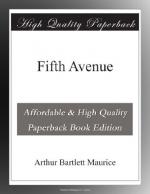But nearer at hand, as the hours creep one by one towards the dawn, are the derelicts of the Square, dozing fitfully on the park benches. In waking moments their dull eyes watch the illuminated face, and the hands pushing forward to another day. The spectacle moved one of them, Prince Michael, heir to the throne of the Electorate of Valleluna, in O. Henry’s “The Caliph, Cupid, and the Clock,” to pessimistic utterance. “Clocks,” he said, “are shackles on the feet of mankind. I have observed you looking persistently at that clock. Its face is that of a tyrant, its numbers are false as those on a lottery ticket; its hands are those of a bunco-steerer, who makes an appointment with you to your ruin. Let me entreat you to throw off its humiliating bonds and to cease to order your affairs by that insensate monitor of brass and steel.”
Sang Sara Teasdale:
“We walked together
in the dusk
To watch the tower grow dimly
white,
And saw it lift against the
sky,
Its flower of amber light.”
CHAPTER VI
Some Great Days on the Avenue
Some Great Days on the Avenue—Pictures and Pageants—When a Prince Came Visiting—A Regiment Departs—Honour to the Captains—Funeral Processions—Receptions—Dinners—The Orient and the Avenue—When Admiral Dewey Came Home—Greeting a Marshal of France—The Roar of the City and the Guns of the Marne.
In the stirring times in which we are living, it seems as if every day is a great day on the Avenue. Take a single example: The morning broke dark and threatening. Heavy clouds presaged showers. But after an hour or two they passed from the heavens, and warmth and golden sunshine came. In the course of various activities the writer made his way to points between the Battery and Fifty-ninth Street, and the means of travel employed included three journeys on top of Fifth Avenue buses. If one of the early settlers could only have seen the proud and amazing thoroughfare!
The air vibrant with excitement. Flags everywhere. Tens of thousands of the Stars and Stripes. Thousands of Union Jacks and Tricolours of France. Hundreds of pavilions of Italy and Belgium. Every few yards gaily decorated booths from which smiling women or lusty-lunged men harangued the passers-by to “come across or the Kaiser will.”
On a platform erected on the steps in front of the Public Library a slight figure in kilts addressing a swaying, surging crowd. As the bus, held up for a minute by the cross-town traffic, stopped, we could hear the pleasing burr of Harry Lauder. Two hours later; a mile and a half farther downtown. The sound of a band in the distance. The horses of the mounted policemen forcing back the curious thousands to the curb. A regiment of regulars, two regiments of militia, and then, swinging along lightly in loose step, a handful of men in soiled blue, Chasseurs a pied of France, who, at Verdun, in the Vosges Mountains, and on the Picardy front, had lived splendidly up to the traditions of the men with the hairy knapsacks and the hearts of steel whose tramp had shaken the continent of Europe one hundred years before.




